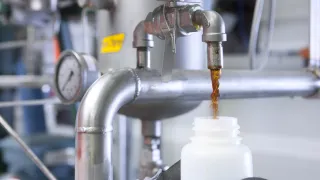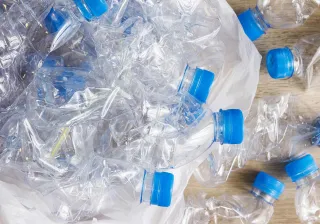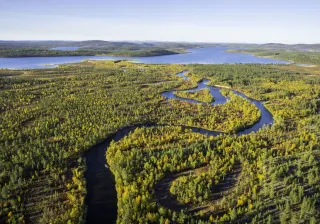Chemical industry needs to look for new sustainable sources of carbon for its products to replace fossil feedstocks. GreenAro project will develop sustainable production routes from renewable raw materials to aromatics needed in high volume for the production of products such as glues, paints and plastics.
VTT Technical Research Centre of Finland, Aalto University and Åbo Akademi University are developing together with Finnish companies new pathways from renewable raw materials to valuable aromatic chemicals. The focus is on benzene, toluene and xylene (BTX) aromatics which are currently produced in high volumes in oil refineries and petrochemical plants from fossil feedstock. The BTX aromatics are important building blocks with annual global production of millions of tonnes for chemicals and polymers, which are needed to produce everyday materials, such as paints, plywood and plastics.
In a Business Finland funded GreenAro project, BTX aromatics will be produced from two renewable feedstocks: pyrolysis bio-oils and waste glycerol from biodiesel production. The focus of the research will be in the development of efficient and robust catalytic processes. This would secure Finland’s leading position in developing and exploiting innovative technologies for the conversion of abundant sustainable raw materials to green BTX aromatics.
“There is a high demand to find sustainable solutions to produce chemicals and materials containing carbon, and aromatics are significant high volume base chemicals almost purely produced from fossil raw materials. The Chemical Industry Federation of Finland (Kemianteollisuus Ry) has set a target that chemical industry in Finland should become carbon neutral by 2045. Research partners of the project, VTT as the project coordinator, Aalto University (Prof. Riikka Purunen) and Åbo Akademi University (Prof. Dmitry Murzin), are developing together with industrial partners of the project the technological solutions to reach this target.“ explains VTT’s Research professor Juha Lehtonen.
Aromatics are among the most important high volume building blocks of the chemical industry. Specifically, BTX can be used in the preparation of wide range of products, such as plastics, pharmaceutical drugs and glues. Borealis Polymers is one of the project partners in GreenAro, producing aromatic products in Porvoo, Finland. “Our phenol and aromatics unit in Porvoo is strategically important for us and there is an ongoing transformation towards sustainable production. Our SPIRIT programme aims for replacing fossil hydrocarbon feedstocks to renewable or recycled source. GreenAro project extends this ambition from olefins and polyolefins to aromatic products as well.” says Ismo Savallampi, GreenAro steering group member from Borealis.
“The chemicals industry is in a dire need for more sustainable alternatives to fossil resources. Renewable and circular solutions will be the enabler for making the switch. At Neste, we are continuously working on ways to increase the availability of those materials. This is the reason why collaboration within the GreenAro project fits well with our strategy and we are looking forward to advancing more sustainable solutions for BTX chemicals,” says Lars Börger, Vice President Strategy and Long-term Development at Neste.
The project consortium has a strong industrial representation throughout the value chain. Green Fuel Nordic produces fast pyrolysis bio-oil from domestic forest biomass, Valmet technology provides bio-oil production technologies, Neste and Borealis the intermediate aromatics production, and Borealis and Prefere Resins the end uses of the aromatic compounds. The consortium is strengthened by the links with the three Veturi ecosystems of Borealis, Neste and Valmet. Veturi ecosystems are extensive research ecosystem programs funded by Business Finland.
For more information:










